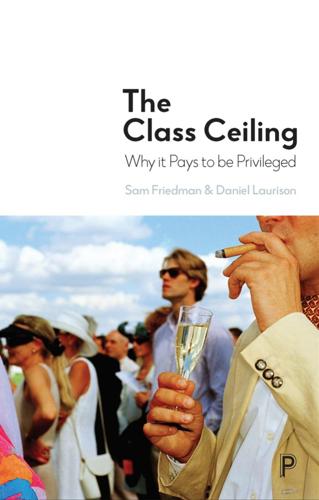
The Class Ceiling: Why It Pays to Be Privileged
by
Sam Friedman
and
Daniel Laurison
Published 28 Jan 2019
And as illustrated by Nathan at the beginning of this chapter, those from upper-middle-class backgrounds tended to narrate their career progression, and that of those around them, mostly in terms of ‘merit’, as the result of talent and, most importantly, hard work.19 Notably, they were also much more likely than upwardly mobile interviewees to see their profession as ‘meritocratic’ and, unlike Dave, almost never questioned 102 The Bank of Mum and Dad the legitimacy of their own success. Moreover, when these interviewees did talk openly about privilege, they were awkward exchanges.20 They often looked visibly uncomfortable, avoiding eye contact or stumbling over their words. The topic of parental money, in particular, was especially fraught. We noticed that even those who acknowledged the ‘Bank of Mum and Dad’ tended to do so in an abstract, generalised way, and almost never talked about specific figures. Peter, a Junior Commissioner at 6TV, was “fortunate” that his mum and dad were able to “help out” when he was trying to break into production.
…
This is because there is a fairly significant tension between benefiting from unearned wealth and adherence to dominant norms of meritocracy. The Bank of Mum and Dad arguably strikes right to the heart of the moral legitimacy of one’s success. Sociologist Rachel Sherman calls this ‘the anxieties of affluence’.23 Like Sherman, we read the privileged as often working hard to downplay or justify their privilege, especially when we asked direct questions about the Bank of Mum and Dad. This orientation played out in three ways. 103 The Class Ceiling First, we were intrigued by the way participants deployed particular stories about the source of family money as a means of justification.
…
Of course it is hard to pull apart the relationship between thinking about privilege and talking about it.25 It is impossible for us to know, for example, whether people like Patricia and Daniel are strategic or unwitting in downplaying their privilege (although we suspect a combination of both). Yet either way, we would stress that this downplaying has important implications for the class pay gap. It means that the true value of the Bank of Mum and Dad goes largely unspoken in professional life, and its distorting influence on individual trajectories remains hidden from public view. Money matters less at Coopers and Turner Clarke We have seen various ways in which the Bank of Mum and Dad acts to shape the work trajectories of those in elite occupations from different class backgrounds. It is worth reiterating, however, that this varies very significantly by occupation.
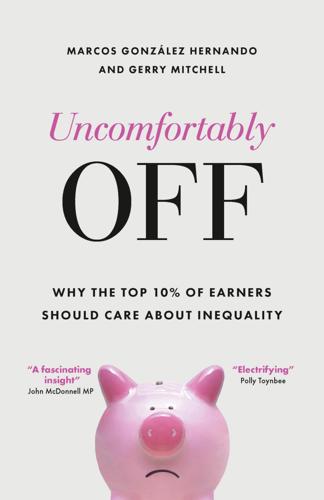
Uncomfortably Off: Why the Top 10% of Earners Should Care About Inequality
by
Marcos González Hernando
and
Gerry Mitchell
Published 23 May 2023
In particular, the boroughs of Kensington & Chelsea and Hammersmith & Fulham have an average yearly income of £63,286, which would position the average earner living there firmly in the top 10%.24 One of Friedman and Laurison’s most interesting arguments in The Class Ceiling is that among the most important mechanisms by which privilege is reproduced at the top is the fact children from privileged backgrounds can rely on what they call ‘the bank of mum and dad’.25 In other words, the children of affluent parents have the possibility of delaying their entry into the workforce even while living and studying in places like London, where housing costs and salaries are highest. This allows privileged children to work in unpaid internships, spend more time in education, grow their networks and hone their skills so that they can compete in ever more specialised and credentialled labour markets.
…
The stamp duty holiday introduced in July 2020 to kick-start the housing market, together with increased demand for larger properties due to homeworking, has contributed to the fastest rise in house prices since 2005.44 The average age for owning your first home is now 33 and a third of those first-time owners will have had help from ‘the bank of mum and dad’, partnering or government support.45 After more than a decade of low interest rates and rising house prices following the 2008 financial crisis, the 2020s are now seeing interest rates and house prices increase – and sharply so. This could have serious political repercussions if highly indebted homeowners – having been sold the idea of home ownership as a rite of passage and ploughed hard-earned savings into their deposits – were to see mortgages become increasingly unaffordable or unavailable, as indeed we saw in the market response to Truss’s 2022 mini-budget.
…
London: Head of Zeus. 231 Uncomfortably Off Thomas, M.E. (2020) Saving democracy. The 99% Organisation. 9 September. https://99-percent.org/saving-democracy Tilly, C. and Tilly, C. (1998) Work under capitalism. Oxford: Westview Press. Toft, M. and Friedman, S. (2021) Family wealth and the class ceiling: The propulsive power of the bank of mum and dad. Sociology, 55:1, 90–109. Törmälehto, V.-M. (2017) High income and affluence: Evidence from the European Union statistics on income and living conditions (EU-SILC). Eurostat Working Papers. Luxembourg: Publications Office of the European Union. Toynbee, P. (2022) These Tories are heading for oblivion, and no amount of U-turns can change that.
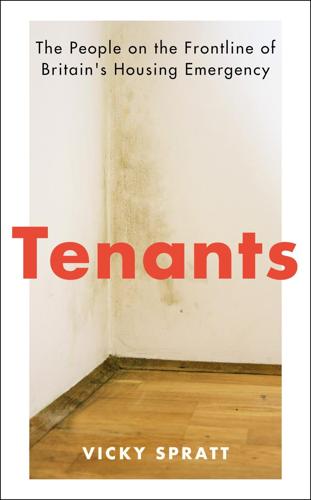
Tenants: The People on the Frontline of Britain's Housing Emergency
by
Vicky Spratt
Published 18 May 2022
Had Anthony’s eviction come twenty-four hours later, although it might still not have been stopped entirely, no bailiffs, symbolic as they are of a landlord’s power and control, would have been able to attend. That night, it was freezing. Awake, Anthony wondered where home would be now? He grew up in a council house with his brothers; he had no Bank of Mum and Dad to bail him out. ‘If it was this easy for landlords to make people homeless, it should be easier to get help,’ he thought as he lay there. Anthony had lived in Brighton for twenty years. He felt that everything he had worked for ‘meant nothing’, the eviction was ‘a real kick in the teeth’.
…
The aspirational nature of council housing is also discussed by John Boughton in Municipal Dreams. ‘It is a portal, a gateway’: Arundhati Roy, ‘The Pandemic is a Portal’, Financial Times, 3 April 2020. 2 Life for Rent average house sale prices in Peckham increased: Melissa Lawford, ‘“Posh” Peckham’s house prices fuelled by bank of mum and dad’, Financial Times, 15 August 2018, www.ft.com/content/39b91420-9c84-11e8-88de-49c908b1f264 ‘from Mum and Dad’: Ibid. ‘year zero’: See Gavriel Hollander, ‘Thirty years on: how the Housing Act changed everything’, Inside Housing, 24 January 2019, www.insidehousing.co.uk/insight/insight/thirty-years-on-how-the-housing-act-changed-everything-59821 banks tend to give mortgages more readily: This is evidenced in the fact that in the boom years of 1996–2006 first-time buyers were entering the market in large numbers, putting homeownership close to an all-time high.
…
nowhere affordable for key workers: ‘Camborne NHS nurse “may have to leave job” over housing crisis’, BBC News, 25 November 2021, www.bbc.co.uk/news/uk-england-cornwall-59409301 companies are seeing staff members leave: Ben Chu, ‘London housing crisis forcing workers to quit their jobs, says CBI survey’, Independent, 26 April 2018, www.independent.co.uk/news/business/news/london-housing-crisis-cbi-survey-workers-quit-capital-house-prices-rent-a8321551.html figures provided by housing officers in September 2020: Amanda Cameron, ‘New figures reveal exactly how many affordable homes have been built in Bristol’, Bristol Post, 18 September 2020, www.bristolpost.co.uk/news/bristol-news/new-figures-reveal-exactly-how-4530278 This was, in part, because of arbitrary caps: Darren Baxter and Luke Murphy, Priced Out? Affordable Housing in England, Institute for Public Policy Research (2017). Available at www.ippr.org/research/publications/priced-out-england 6 The Rent Trap supports nearly one in four home purchases: Legal & General and Cebr, The Bank of Mum and Dad (2020). Available at www.legalandgeneral.com/landg-assets/personal/retirement/_resources/documents/bomad-2021.pdf their chances of owning a home in the UK: Jonathan Cribb, Andrew Hood and Jack Hoyle, ‘Just 1 in 4 middle-income young adults own their own home – down from 2 in 3 twenty years ago’, Institute for Fiscal Studies, 16 February 2018, ifs.org.uk/publications/10506 there has long been an assumption: Loretta Lees, ‘Gentrification and Social Mixing: Towards an Inclusive Urban Renaissance?’
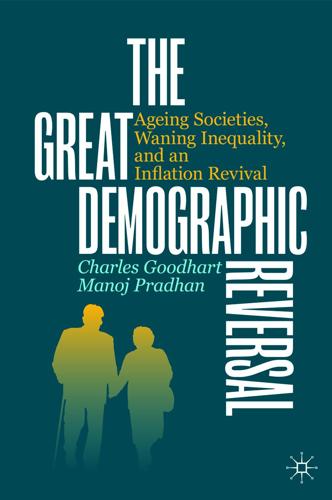
The Great Demographic Reversal: Ageing Societies, Waning Inequality, and an Inflation Revival
by
Charles Goodhart
and
Manoj Pradhan
Published 8 Aug 2020
But they need to allocate those savings for the future use, e.g. for housing down payment, or indirectly by building up human capital. From the point of view of parents, these social changes will then be reducing the prime period of saving for retirement by a large chunk (reducing that period from, say, 45–65 to 52–67). And the rising cost of housing and of university education puts pressure on the bank of Mum and Dad. If that bank is providing more finance to their children, there can be less set aside for future retirement. Some assume that forward-looking households will consume less with an eye on their pension plans. Papetti (2019) argues that:[with] perfect foresight, the representative household realizes that the growth rate of the number of effective workers in support of the number of total consumers (the population size) is shrinking over time.
…
Consequently, in an ageing society, there will be more households and a maldistribution of space. Currently the larger number of old living apart is being offset (on the number of households) by more young living with their parents, owing to the high cost of separate accommodation. Even here, calls on the bank of Mum and Dad will reduce savings for retirement, as in Chapters 5 and 6. For all these reasons, we believe that mainstream theorists have been too sanguine about the strength of future personal savings ratios. Turning next to the corporate sector, we believe that the main problem is to understand why corporate investment in the advanced economies has been so sluggish in recent years.
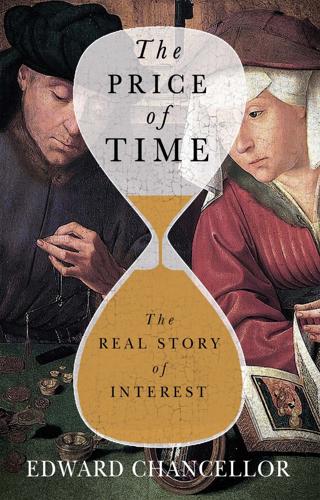
The Price of Time: The Real Story of Interest
by
Edward Chancellor
Published 15 Aug 2022
As homes prices climbed faster than incomes, many found themselves locked out of the property market at a time when developers focused on building luxury properties and more properties were being sold to financial investors.96 In the United States, Europe and Australia, the homeownership rate was stagnant or plummeting.97 By 2018, the average age of US housebuyers had reached forty-six years, the oldest on record.98 In the United Kingdom, ‘Generation Rent’ arose.99 Despite low mortgage costs, most first-time buyers couldn’t scrape together a deposit. Many were assisted by a new financial institution, known as the ‘Bank of Mum and Dad’. Homeownership was fast becoming a preserve of the professional classes.100 The British government offered a subsidy to first-time buyers in 2013, but this subsidy pushed up house prices even further.101 Politicians promised to build more homes, but the number of new houses needed to make housing affordable again was inconceivably large.
…
W., 72 Charles II, King of England, 33, 38 Chase National Bank, 87, 88 Chaumont, the Widow, 54–5 Child, Sir Josiah, xxii, 33–4, 35, 36–7, 37*, 38–40, 41, 43, 44, 202 China: authoritarian relapse in recent years, 288–9; back-alley banking, 281–3; capital controls in, 262, 266, 285; capital flight from, 285–6; and ‘commodity super-cycle (from 2010), 173–4, 255–6; corporate zombies in, 277, 281, 285, 289; corruption in, 270, 274, 275, 287–8, 287*; currency devaluation (2015), 227; debt-deflation in, 280–81; Deng’s reform era, 265, 266, 267; and digital currencies concept, 294; economic stimulus plan (2008/9), 270, 271–81, 282, 289, 292; export driven expansion, 132, 182, 267–70; and financial repression, 264–5, 265*, 266–81, 268*, 283, 286–9, 292; foreign capital inflows, 254–5, 256, 265–6, 267, 270, 270*; garlic bulb bubble, 173, 271, 282; ‘great divergence’ from West, 288; growing inequality in, 287–8, 287†; high occurrence of elevator accidents, 274, 274*; high-speed rail expansion, 275; housing boom during Covid pandemic, 310; increased share of world trade, 260; ‘iron rice bowl’ removed, 268; joins WTO (2001), 267; as leading producer of greenhouse gases, 277–8; long tradition of impressive investments, 276; ‘national team’ of state enterprises, 272, 272*; and new technologies, 177, 276, 283, 284; paper money invented in, 265; ‘Red Capitalism’, 280, 284, 292; savings/current account surpluses, 129, 268–9, 270; ‘shadow banks’ in, 266, 270, 282*, 283–5, 286; SHIBOR lending rate, 284; and taper tantrum (June 2013), 256, 284; treatment of Uighurs, 288; Trump’s trade wars with, 262; uncoordinated investment in, 266, 269, 270, 272–4, 275–9, 280–81; undervalued exchange rate, 267–8, 270, 271; unscrupulous vested interests, 270, 286–9; unstable bubbles in, 270, 271–4, 282, 288; unsustainable debt in, 270, 279–81, 282–5, 289; US loss of manufacturing jobs to, 261, 261*; vast investment boom in, xxiii, 128, 267–81, 280*, 282–9; wealth management product (WMP), 283–4; Wenzhou’s credit crunch (2011), 282–3 Chu, Charlene, 280 Citigroup, 232† Clapham, Sir John, 79 Clarida, Richard, 310 classical economists, 12, 14, 27–8, 31, 41, 85*, 130–31, 132–3, 183 see also Smith, Adam Clifford & Sons, 63 climate change, 255, 277–8 cloth trade, 14–15, 22, 23 Cobham, Thomas of, 19–20, 26 Coffin, Charles, 156 Cole, Christopher, 229*, 231 collateralized debt obligations (CDOs), 116, 227 collateralized loan obligations (CLOs), 227 Commerzbank, Germany, 245 compound interest, xvii, 8–9, 190, 200, 202 Conard, Joseph, 141* Connally, John, 251, 262 Consols (British bonds), 62–3, 65, 65†, 70, 77, 79, 80, 126 Conti, Louis Armand II, Prince of, 55 Coolidge, Calvin, 87, 92–3 corporate sector: benefits of low interest rates for, xxii; the financialized firm, 166–7; ‘good will’ on balance sheets, 169, 180; profits bubble in post-crisis USA, 183, 185, 211; ‘shareholder value’ philosophy, 163–6, 167, 170–71 corruption, 63, 258, 274, 275, 287*, 288; in China, 270, 274, 275, 287–8, 287*; Galbraith coins ‘bezzle’ term, 287 Coughlin, Father Charles, 242 Coupe, Mike, 160 ‘coveitise’, practice of, 24 Covid-19 pandemic, xxii, 224*, 304, 305–7, 309–10 Cowen, Tyler, 198 Coxey’s Army, 201 credit: in ancient Near East, 3, 5–10, 11, 15; and Borio’s financial cycle, 132, 134, 135; causes of booms, 42, 43, 44, 118, 176–7, 220; central bank dominion over markets, xxii, 292–3, 293*; collapse in quality in post-crisis decade, 222–4, 231, 233, 237–8; decline in quality during booms, 112, 116, 135–6; Defoe on, 28; emergence of modern credit cycle, 62–4; expansion in 1920s USA, 87–91, 92–4, 96–8, 112, 203; growth before 2008 crisis, 112–13, 114, 115, 116; Law’s credit theory, 47, 60; in medieval Italy, 22–3, 35; poor quality in expanding China, 266; as pre-dating barter, 3, 14; psychological elements, 64; rationing under Bretton Woods system, 291; strong growth of as red flag, 132, 135; unequal access to, xxii, xxv, 14, 15, 215; vast investment boom in China, xxiii, 128, 267–81, 280*, 282–9; Wenzhou’s credit crunch (2011), 282–3 Credit Suisse, 229 Creditanstalt, collapse of (1931), 93, 93*, 243, 261 Cruz, Gaspar da, 276 cryptocurrencies, 173, 177–9, 307–8, 312 Culpeper, Sir Thomas, the Younger, 34–5, 44 Culpeper, Sir Thomas, ‘Tract Against Usury’ (1621), 34, 35 Cyprus, 262 Dalio, Ray, 217, 229, 291 Datini, Francesco, 21–3, 24 Dawes Loan (1924), 91 Deaton, Angus, 213 debt: after 2008 crisis, 138–9, 237, 237†; ancient debt tablets, 5–6; ‘balance sheet recessions’, 191; cancellation/jubilees/clean slates, 9, 300; dangers of cheap credit, 32, 44; debt bondage, 5, 9, 18; ‘debt supercycle’, 135; ‘debt trap’, 43, 135, 280; debt-deflation, 98–9, 100, 119, 280–81; debt–service ratio, 135; ‘evergreening’ of bad debts, 136, 145–6, 280; late payment penalties, 10, 14, 25; Lord King on (2019), 304; as missing link in secular stagnation narrative, 135–6, 138–9; mortgage equity withdrawal, 112–13, 191, 205; problem of compound interest, 8–9; Proudhon on, xvii, xviii; revival of subprime market, 215, 221, 224; student debt ‘bubble’, 212, 213; tax structures favour over equity, 164; transferable/heritable in Babylon, 7 deflation: after 1929 Crash, 98–9, 100, 101, 105, 108; Austrian economists’ view of, 100, 101, 105, 113, 133–4; crisis of 2008 revives fears of, 119, 122; debt-deflation, 98–9, 100, 119, 280–81; in early-1920s Britain, 85–6; and Fed’s post-2008 policies, 236–8; ‘forgotten depression’ (1921), 84, 86, 100, 143; and high rates of interest, 42, 43, 64; impact of zombies, 237, 237†; impact on working people, 99–100; in Japan from 1990s, 100–101, 107–8, 114, 119, 135, 136, 145–6, 147, 148, 182, 191, 193; in late nineteenth century, 78–80, 99, 101; in post-Great War period, 84, 85–6; as preoccupation of modern central bankers, xxiii, xxv, 76, 112, 115, 115†, 122; Say’s view of, 99; and Victorian era, 76; view of as good/not harmful, 99–101, 113–14, 132; and Wicksell’s view of interest, 42 Defoe, Daniel, 28, 46, 47, 56, 57, 202, 308 Del Monte Foods, 222 democracy, 293, 293†, 296, 297; the old as largest voting cohort, 211–12; rise of populism, xxii, 299; weakening support for, 299 demographics: ageing societies, 29, 127; ‘Bank of Mum and Dad’, 212; generational impact of 2008 crisis, 211–12, 213; Alvin Hansen on, 126; and interest, xxiv, 10, 12, 126–7, 131, 133; largest voting cohort as old, 211–12; life expectancy statistics, 198, 213; and secular stagnation argument, 125, 126, 129; student debt ‘bubble’, 212, 213; and ‘time preference’ theory, 29 Demosthenes, 18† Deng Xiaoping, 265, 266, 267 Denmark, 242, 244, 245, 247 Deutsche Bank, 147* Dodd, David, 90–91 Dodd–Frank Act (2010), 232 Dogecoin, 308 Dollar Standard, 118, 251–2, 253, 261, 262–3, 267 Dostoyevsky, Fyodor, 294 Dotcom bubble, 111–12, 136–7, 176, 204, 206 double-entry bookkeeping, 21–2 Douglas, C.
…
Enoch, 290 Powell, Jerome, 262, 305, 310 Price, Richard, 8–9 price-stabilization policy of 1920s, 86, 87–91, 89, 92–4, 96–8, 108, 112, 120, 203; contemporary criticisms of, 87, 88, 90–91, 92, 97–8, 101; Hayek’s critique of, 92, 96, 96*, 101, 105, 108, 114, 133; rate cut after Long Island (1927), 83, 88, 92, 98; tightening (1928), 93, 94, 98, 108, 261 private equity firms, xxii, 162–3, 166, 204, 207, 223 ‘promoter’s profit’ concept, 158–9, 160, 161, 164 property markets: ‘Bank of Mum and Dad’, 212; booms in Spain and Ireland, 253; bubble in US before 2008 crisis, 112, 114, 115, 115†, 116, 117, 148, 191, 205; bubbles as red flags, 132, 135; bubbles in 1920s USA, 90, 93; bubbles in 1980s Japan, 106–7, 108; bubbles in post-crisis decade, 44, 173, 174–5; Chinese bubble, xxiii, 271, 272–4, 282, 288, 289; Fannie Mae and Freddie Mac, 292; ‘Generation Rent’ in UK, 212; housing affordability crisis in UK, 212–13; housing crisis in UK, 174; housing in ancient world, 15; importance of interest rates, 15, 44, 173, 174–5; inequality after 2008 crisis, 210–11, 212–13; mortgage equity withdrawal, 112–13, 191, 205; negative growth impact of building booms, 135–6, 144–5, 148; and negative interest rates, 174, 245; New York’s pencil towers, 209; post-2008 recovery in luxury real estate, 209–10, 212, 213; and quantitative easing, 292; skyscraper building in 1920s, 90; Turkish bubble bursts, 259–60; Xi’s ‘three red lines’, 310 protectionism, 261–2 Protestant Reformation, 26 Proudhon, Pierre-Joseph, xvii–xviii, xix, xxi, xxv, 9, 306 ‘public choice’ school, 286–7 Puerto Rico, 196 quantitative easing, 131*, 138, 236, 239–40, 263, 292; and ECB, 146, 241, 242; by Emperor Tiberius, 12; Fed’s rounds of, 175, 228, 238, 240; and international carry trade, 137; in Japan, 241, 242, 294; Law anticipates, xxii; and market volatility, 228, 237; the rich as chief beneficiaries of, 12*, 214, 215; timeline for adoption of, 241 Quarles, Francis, 172 Radio Corporation of America, 90 Rae, John, 30, 31 railways: in 1930s USA, 142–3; amalgamations in robber baron era, 157, 158, 159; in Argentina, 80, 80*; China’s high-speed network, 275; completion of US and European networks, 78; nineteenth-century manias, 70–72, 73–4 Rajan, Raghuram, 133, 134, 192, 205 Rand, Ayn, 110 rare earth elements, 173 Razak, Najib, 258 regulation of financial markets: after 2008 crisis, 227, 232, 292–4, 304; in ancient Near East, 9–10, 14, 24; Basel banking rules, 232; under Bretton Woods, 291; and causes of 2008 crisis, 114–15, 117; compliance staff, 232†; and interest rates, xxv; ‘macroprudential’ regulation, 232–3, 293; National Banking System in USA, 157; off-shore regulatory arbitrage, 65; ‘regulatory arbitrage’, 9–10, 14, 23–4, 65, 232–3 Renaissance, Italian, 21–4, 25 rent, xxiii*, 7, 15, 26, 31, 37, 212, 237, 299 Rifkin, Jeremy, The Zero Marginal Cost Society (2014), 127–8 Rigby, Edouard de, 56 risk: carry trading, 220–24, 227, 229, 233, 234, 236, 237–8; and central banks, 230–31; as central to capitalism, 220, 298; duration risk, 224–6; insurance underwriting, 219–20, 219†, 233; liquidity risk, 72–3, 75, 226–8, 304–5; measurement of, xxv, 139, 176–7, 218–19, 220–34; medieval Church acknowledges, 25–6; mispricing of, 176–7, 220, 222, 230–31; moral hazard, 75, 76, 136, 220, 226, 233, 284, 298; ‘portfolio balance channel’, 222; premiums, xxv, 12, 13, 14; ‘risk parity’ strategy, 229; and ultra-low interest rates, xxi, 52–61, 64–73, 77–81, 121–2, 135–9, 145, 149, 176–9, 220–34, 283, 285, 291–2; variety/types of, 219, 224–8; and volatility, 228–30, 233, 234, 254, 304, 305 Rist, Charles, 82, 83, 92 Robertson, Dennis, 97, 124, 311, 311* Robinhood Markets, 307 Robinson, Joan, 11 Robinson, William, 65 Rockefeller, John D., 157, 203 Rogoff, Kenneth, 235–6, 245, 294 Romania, 253 Rome, ancient, 9, 11, 12, 13, 13, 15, 25; attitudes to usury, 17–18, 20–21, 200, 219 Roosevelt, F.
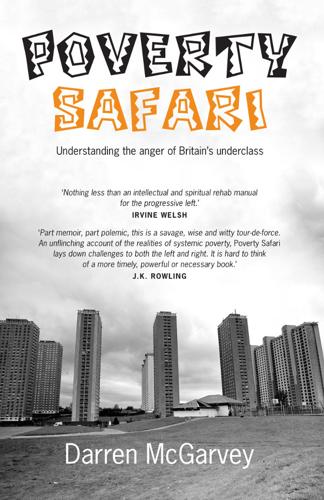
Poverty Safari: Understanding the Anger of Britain's Underclass
by
Darren McGarvey
Published 2 Nov 2017
Five have poor concentration that has impacted on their education. Five suffer from social anxiety. Five have experienced emotional and mental health problems that predispose them to stress. Zero have gone to university. Zero are on the housing ladder. Zero have any savings. Zero have access to a bank of Mum and Dad. Zero are involved with an activist group. Zero are active members of a political party. Zero regularly visit libraries or places of cultural interest. Zero go on foreign holidays at least once a year. And none of us care for Radio 2, yoga or Quorn-based food products either. It’s a lot more striking when you think about it like that, isn’t it?
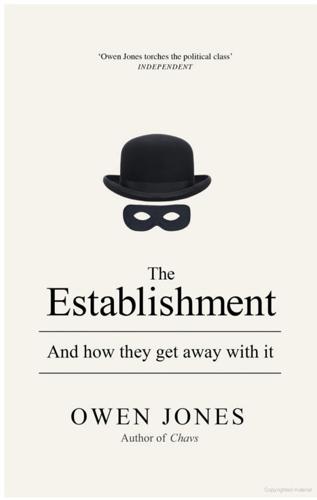
The Establishment: And How They Get Away With It
by
Owen Jones
Published 3 Sep 2014
Media outlets have increasingly become a closed shop for those from privileged backgrounds. The less well-off are filtered out for a number of reasons. First, there’s the proliferation of unpaid internships, which force aspiring journalists to work for free for long periods, often with little prospect of a paid job. Generally, only those able to live off the Bank of Mum and Dad can afford such exploitation, particularly in London, one of the world’s most expensive cities. Another barrier is the rise of costly postgraduate qualifications, which are often now prerequisites for getting a foot in the door of the industry. ‘Twenty years ago, you would have been taught loads of stuff on the job,’ says New Statesman deputy editor Helen Lewis, ‘but now they’ve outsourced all of that labour to journalism students, who are expected to pay for their own training, and then turn up and still take a crappy job on £15,000, but have mysteriously invested £9,000 themselves.’

Posh Boys: How English Public Schools Ruin Britain
by
Robert Verkaik
Published 14 Apr 2018
But Osborne didn’t bother waiting for permission from either the Cabinet Office or the Advisory Committee on Business Appointments (ACOBA).6 For Owen Jones, Osborne’s seamless switch from Westminster to Fleet Street reflected the gulf between the unconnected working class and the wealthy elite. Talented working-class aspiring journalists are discriminated against because they can’t live off the Bank of Mum and Dad. With few exceptions, only the well-to-do can afford to do the unpaid internships and expensive journalism masters’ degrees that increasingly must adorn the CVs of those with hopes of making it into journalism. Having parents with connections has helped multiple journalists, too. And yet a man with precious little experience in journalism – other than being rejected by the Times’s graduate scheme – can get parachuted into the editor’s seat of a major newspaper because of who he is and who he knows.
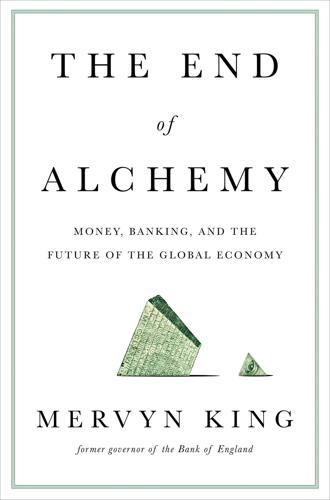
The End of Alchemy: Money, Banking and the Future of the Global Economy
by
Mervyn King
Published 3 Mar 2016
It is used to urge the European Central Bank to lend to sovereign governments within the euro area, and to imply that the IMF should lend to any country in difficulty; I have even heard it used by sports teams in financial trouble who believe that the league in which they play should bail them out. The expressions ‘lender of last resort’ and ‘bailout’ have become synonymous. It is only a matter of time before there is a demand for a LOLR for the Bank of Mum and Dad. Bagehot’s argument was very different. In essence, the problem was that the banking system was an intermediary financing illiquid assets by promising instant liquidity to depositors. For the economy as a whole, the promise cannot be met. When enough depositors want their money back, the banking system cannot provide it.